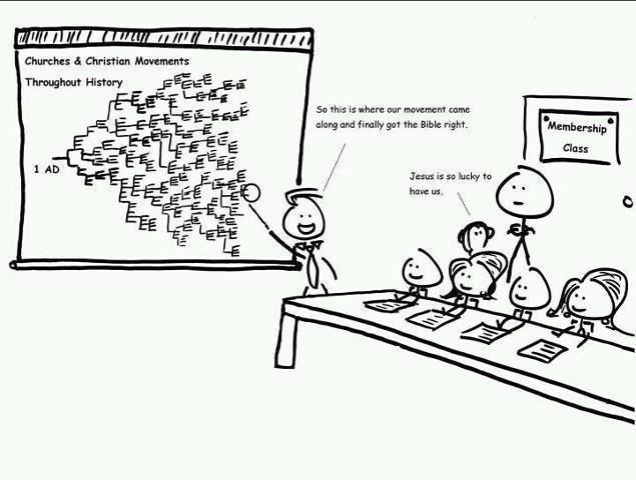 On that fateful day, 27 October 1553, on the plain of Champel at the gate of Geneva, whilst the flames were engulfing Michael Servetus, he used his last breath to cry out in a loud voice, “O Jesus, Son of the Eternal God, have pity on me!” The words were ignored by the bystanders, and Servetus died soon afterwards.
On that fateful day, 27 October 1553, on the plain of Champel at the gate of Geneva, whilst the flames were engulfing Michael Servetus, he used his last breath to cry out in a loud voice, “O Jesus, Son of the Eternal God, have pity on me!” The words were ignored by the bystanders, and Servetus died soon afterwards.
Commenting on the affair, in his Calvin: A Biography, Bernard Cottret wryly remarks: “He passed away after committing a terrible error of syntax; he cried out, ‘Oh Jesus, son of eternal God, have pity on me!’ in place of the proper, ‘Oh Jesus, eternal son of God.’” Cottret concludes: “His punishment was due to the misplacing of a single adjective. Heresy is never anything but a question of grammar.”
Servetus did not agree with John Calvin’s doctrine of the Trinity, and so rejected the notion of Christ’s eternal sonship. The solution to his heresy was a simple alteration of words, a “confession” that would set the matter straight. And so William Farel, like a good grammar teacher, tried to persuade Servetus in his final hours to fix his sentence construction and earn his freedom. But of course Servetus didn’t.
The Chronicles of Geneva
The obsession with a correct articulation of words and sentences as a sure antidote to heresy governed the religious thinking of 16thcentury Geneva. The Registers of the Consistory of the city confirm as much. The single theme that recurs throughout these records, in some or other form, has to do with the citizens’ ability to recite the “Pater” and the “confession” faultlessly. And yes, these people were summoned to appear in front of the consistory if there were any doubts about their religious commitments.
Here are some typical extracts, dating from the years 1542 and 1543. In each case, John Calvin was present:
Jacques Emyn: Summoned to render an account of his faith. He responded that he had made little progress and said the Pater, “Our Father, etc,” and a few words of the creed. The Consistory advise, having given him proper admonitions…
Charriere: She said her Pater fairly well, the creed very little. Remanded to Thursday.
The sheath-maker’s wife: …in the French language she could not say her creed; in Latin in a general way.
Clauda, daughter of Tyvent Joctz: …said the prayer poorly, and does not know the confession. She was admonished…
And so it goes on, page after page, month after month, year after year. The only other spiritual activity that enjoyed the same scrutiny was the attendance of Monsieur Calvin’s sermons. The question, “Are you born again?” does not appear in the records.
The error behind the contemporary definition of heresy hinges on the very misunderstanding that governed the thoughts of the religious elite in Calvin’s Geneva, namely that it is possible to capture and preserve the essence of the sacred in a formulation that consists of mere human words and nothing more.
It should be noted that this understanding obscures the true nature of evil by subtly suggesting that one can banish it through the powers of a credal construct. Words arranged in the correct order becomes a type of magic charm that can dispel the darkness of the human heart. If only I can extract the good confession from the heretic, I will have destroyed the heresy. If not, I will have to destroy the heretic. (If not by fire, then by rumour).
The Real Problem
Where on earth did this idea come from?
We could approach the question like good historians, citing a pendulum-like overreaction on the Reformers’ part to the mysticism of the late Middle Ages.
Or we could point to the fact that the Reformation coincided with the dawn of the Renaissance – that golden era of enlightenment rationality, the scientific method and the birth of the industrial process and left-brained utilitarianism.
Or we could remind ourselves that the power of words experienced a revival during Luther’s time due to Gutenberg’s invention that immortalised the speech-bubble by turning it into print, hence the centuries-old association between the Protestant message and the gospel tract. And so on.
We can do so, but we will be scratching the surface.
The idolisation of words as containers of spirituality stretches much further back than the time of the Reformation. It even precedes the word-obsessed religious subculture of first-century Palestine – one that prompted Jesus to rebuff prayers that relied on a vain repetition of words to increase their efficacy, and rebuke those who confessed him with their lips whilst their hearts were far from him.
In fact, it predates the Isaiah passage that Jesus quoted from, “…this people draw near with their words” and “their reverence for me consists of tradition learned by rote” (Isaiah 29:13, NASB), and it does so by millennia.
The Sacralisation of Language
Study the history of religion and you will soon run into the fascinating phenomenon of sacred language.
Like the architectural design of religious edifices symbolising the coveted penetration of the heavens, or the idea that some select locations on the globe are more suitable than others for doing so (this mountain, Jerusalem, Lourdes, Mecca, the “church” around the corner…), or the notion that spirituality is an impossibility without the mediation of a guru or holy man or priesthood of sorts, or the conviction that God is in the habit of assigning strange titles and dress codes to individuals who have learnt about him in settings inaccessible to the general public; the belief persists that there is an indissoluble bond between God’s revelation of himself and the words by which that revelation were conveyed.
The idea might not have been a bad one, were it not for the fact that it suffers from the same malady as our conceptions of what makes a heretic: Everyone seems to have their own version of what God has revealed to us.
And so there are tens of thousands of well-meaning folks, especially in the southern states of the USA, who remain convinced that God’s chosen language of communication is the type of English that King James and his cohorts spoke at the turn of the sixteenth century.
Travel north to Pennsylvania and you will run into Amish believers who are convinced that God would have them read the Bible in Luther’s Gothic Script High German, even though many of them struggle to understand the antiquated language.
Visit a couple of traditional Catholic churches on the way and you will meet people who stubbornly refuse to acknowledge the Second Vatican Council’s reforms in the sixties, that allowed the use of vernacular languages in the Mass in the place of Latin.
There are many other examples.
The phenomenon is not restricted to Christendom. Muslims believe that the Qur’an is a revelation specifically in Arabic and should only be recited in Quranic Arabic. Translations into other languages are mere “interpretations.” Shinto practitioners chant in a form of Japanese that was spoken in the ninth to twelfth century. Hindus worship in Sanskrit, a language considered “dead” by many. Buddhists memorise their texts in Classical Tibetan. And so on.
The pattern repeats itself throughout religious history and can be traced back to the dawn of civilisation as we know it. Sumerian, one of the oldest languages known to humanity (spoken in ancient Mesopotamia of the Bible), was replaced by Akkadian in the second millennium BC, but lived on as a sacred and ceremonial language until the first century.
You cannot really go much further back than that, can you?
You can, in fact: To a time before language existed as we know it today; to a time when the notion of “knowledge” was understood and intended to be conveyed in a manner that transcended the limitations of mere spoken syllables and written symbols.
More about that in the posts to come.
 So what on earth is a heretic?
So what on earth is a heretic? I had barely turned ten when I heard that there was such a thing as a heretic. In my neck of the woods, the biggest heretic was a wederdoper (re-baptizer). A group of them was a sekte, and they were to be avoided like the Bubonic plague.
I had barely turned ten when I heard that there was such a thing as a heretic. In my neck of the woods, the biggest heretic was a wederdoper (re-baptizer). A group of them was a sekte, and they were to be avoided like the Bubonic plague.


 The price for the exhilaration of anticipation is a high one. When we indulge our desires by creating a Jesus that promises to fulfill some or other expectation, we do so at the expense of our commitment to the real Jesus. We pay for banana fever with lettuce leaves.
The price for the exhilaration of anticipation is a high one. When we indulge our desires by creating a Jesus that promises to fulfill some or other expectation, we do so at the expense of our commitment to the real Jesus. We pay for banana fever with lettuce leaves. One of my favourite smart people in all the world is a fellow by the name of George Lakoff. I like Lakoff for a number of reasons, but mostly because of his knack to trace ideas and opinions back to their origins – origins that most of us are blissfully unaware of.
One of my favourite smart people in all the world is a fellow by the name of George Lakoff. I like Lakoff for a number of reasons, but mostly because of his knack to trace ideas and opinions back to their origins – origins that most of us are blissfully unaware of.